Skip ahead
The internet is now an integral part of our lives. It’s no longer just for doing research or staying in contact with friends; most people have made at least one purchase online. E-commerce is showing no signs of slowing down and by 2024, revenue from online shopping in the USA is estimated to be worth $476 billion.
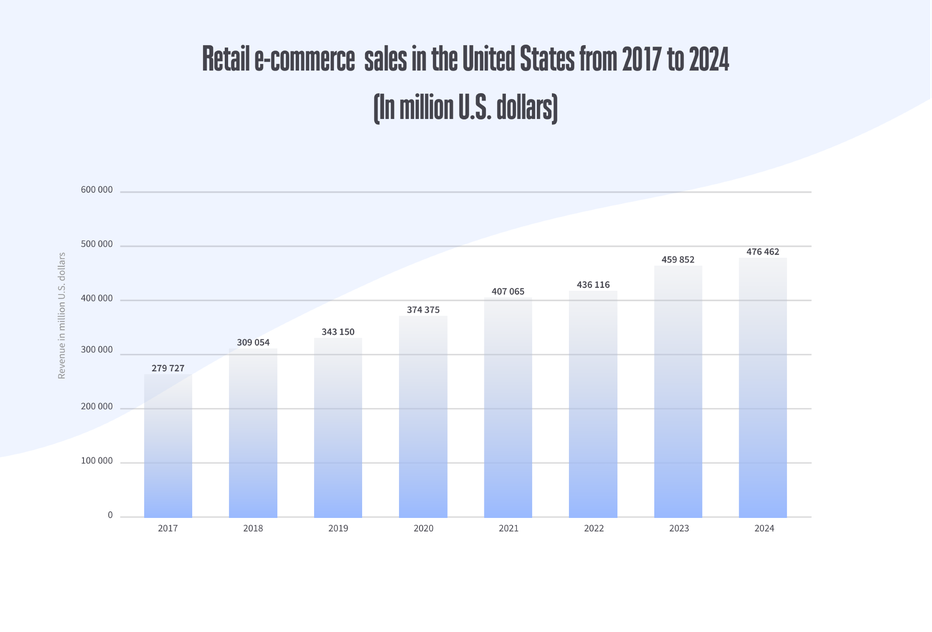
If you’re a retailer or you’re thinking about getting into the retail business, you can’t afford to ignore the internet. Unlike a social media page or Etsy shop, building your own online shopping site gives you full control of the customer experience. Everything from branding to customer service will be exactly as you want it. If you’re convinced that you need to facilitate online shopping but unsure about how to build an e-commerce website, this article will help.
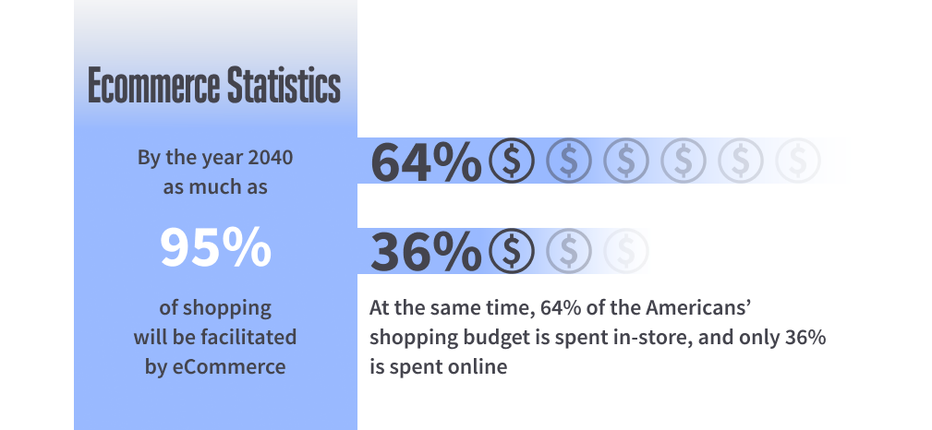
You can either use one of the many website builders available today or build an e-commerce website from scratch. We’ll discuss the benefits of each option and go through the steps involved in e-commerce website development.
How to Build an E-Commerce Website From Scratch: Your Options
It’s not necessarily difficult to build an e-commerce site. There are a number of solutions out there that make it easy even for novices. However, they aren’t appropriate for every business and you need to understand the options available before you make your decision. Not only do you need to know how to build an e-commerce website but you need to know how to build a successful e-commerce website. When you make the right decisions, you’ll have a site that grows with you and serves you for a long time.
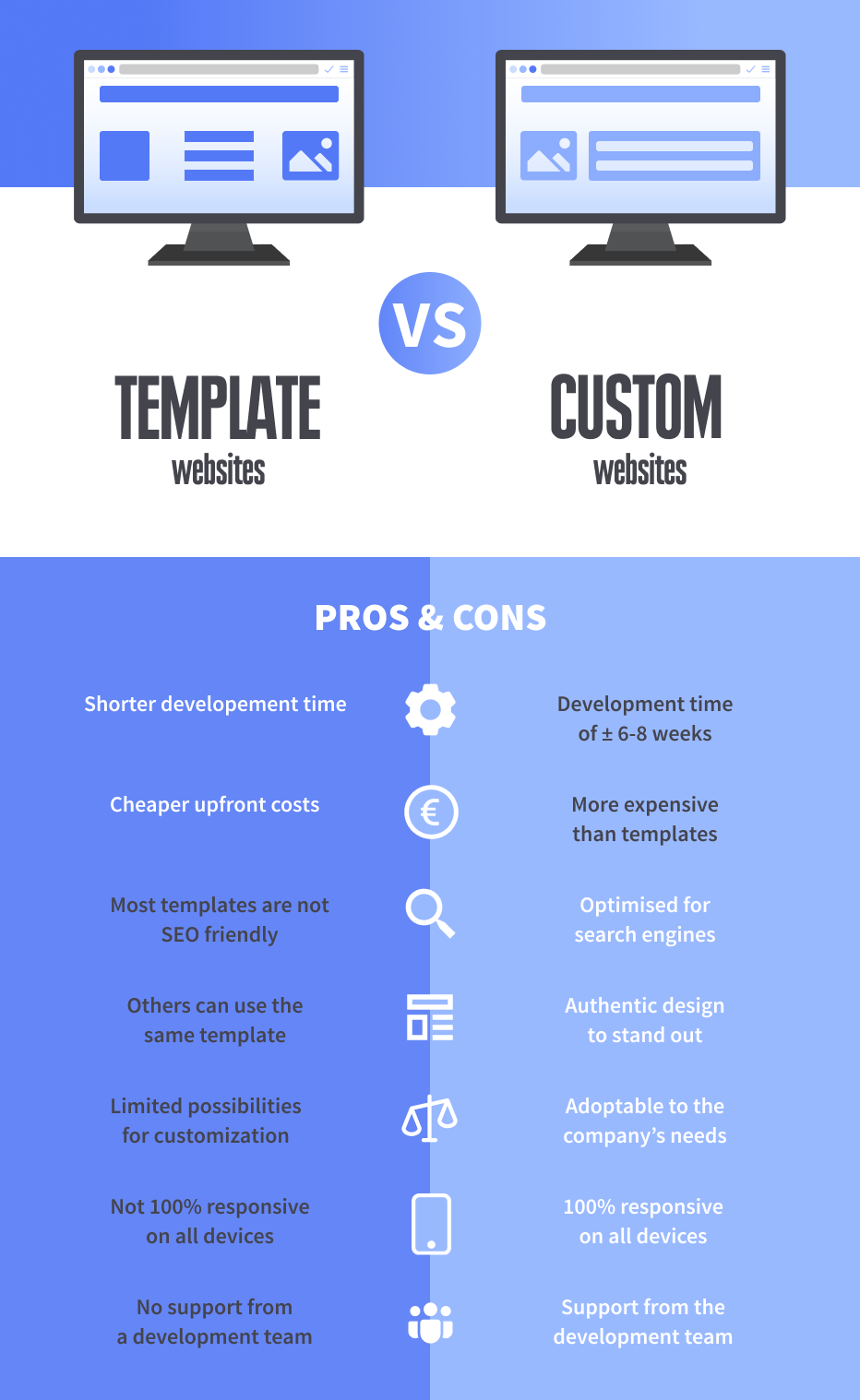
Website Builders
If you want to build a website, the fastest and cheapest way to do so is with a website builder. They provide interfaces that are easy for beginners to use and they offer lots of options for customization. Popular website builders include Shopify, Wix, and Squarespace. WordPress is a more robust content management system that has become the industry standard for websites. It is used by a number of large businesses and can be harder to learn than Wix or Squarespace.
Shopify is a favorite among online sellers since they can easily list products for sale without the need for plugins or knowledge of coding. However, it can be difficult to customize themes and it can get expensive if you need lots of extras. For many businesses, the best option is to build a site from scratch.
Custom E-Commerce Websites
There are several advantages to building your own site from the ground up. For starters, you’ll have full control over how your site looks and functions. You shouldn't underestimate the importance of this if you want your site to make an impact on visitors. While website builders offer customization options, there will always be limits on what you can do.
With a custom site, you’ll be able to include all the usual features that shoppers expect while also adding new features that are unique to your brand. By implementing a custom solution, you can create the best possible user experience.
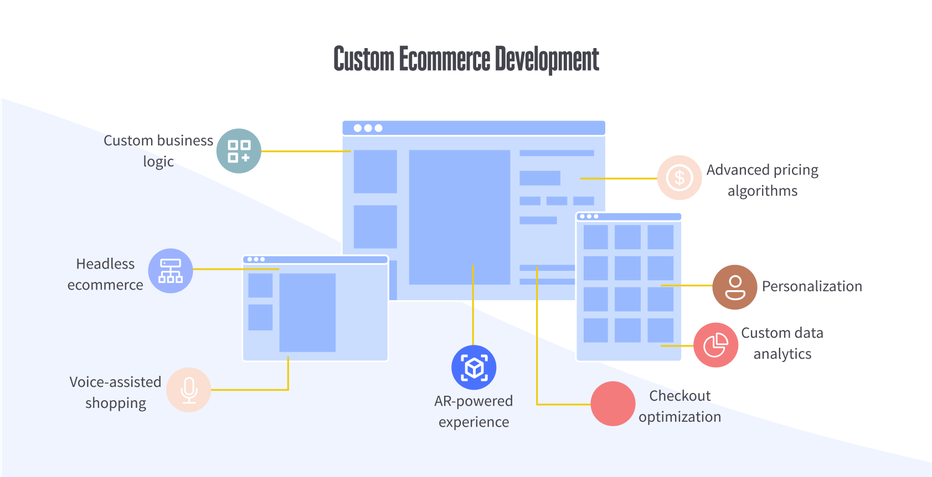
Benefits of Custom Website Development
Using a template-based website is easy and affordable. However, it could end up costing you more in the long run. You gain a lot when you opt for custom e-commerce website development. Benefits of Custom Website Development include:
- More conversions and lower bounce rate. When your website is customized, you’ll be better able to meet the needs of your customers. This can result in increased conversions and more loyal customers.
- Improved search engine optimization. The typical e-commerce solution has generic SEO functions since it’s designed for businesses of all types. By hiring a developer, you can have your site optimized for your industry and your company’s specific needs.
- Better integration with your business model. The most successful e-commerce platforms are those which are seamlessly integrated into a company’s business model and marketing plan. You need a custom-developed platform to do this properly.
If you sell a large variety of products with different sizes and weights or you ship to different countries, you’ll need several types of shipping options. A customized e-commerce solution will make it easier to accommodate different delivery services.
Custom-built websites also give you full control over the security of your website. This is especially important when you’re asking people to hand over their financial details, addresses, and contact details. It’s your responsibility to keep their data safe and secure while also protecting your own operations. Your security needs to adapt as new cyber threats emerge.
One other benefit of building your own site is that you’ll be able to use any payment processor you wish. You won’t be limited by what another company facilitates. Depending on who your customers are, where they’re located, and the type of products you sell, this could be extremely important. Now that you know why you may want to build an e-commerce website from scratch, let’s look at how to build a successful e-commerce website.
Getting Started & The Steps Involved
The exact process will vary depending on the nature of your business but most websites go through similar stages.
Analyzing the Market
Before you start working on your site, the first thing you should do is research your competitors. Take the time to analyze their websites, not just to see the products they offer but to get a feel for how their website looks and functions. Take note of what you like and what you don’t like. You’ll want to avoid their mistakes, improve on the things they’re doing well, and perhaps introduce some innovations.
Getting Clear on What Your Website Will Offer
Whether you sit with a developer or decide to build your site on your own, you’ll need to have a goal in mind. You should be clear about the revenue targets you want to hit and how you’ll price your products. You may not think this has anything to do with web development but it does. If you’re going to be selling budget-friendly products to locals, you probably don’t need the same features as someone selling luxury goods internationally. You should also think about how your store will be different from others in the market. Having a unique selling proposition will help to inform the web development process.
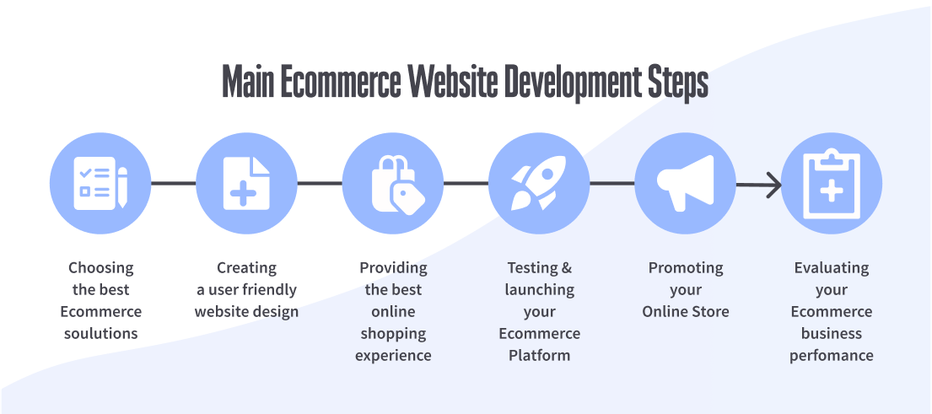
Hiring a Web Development Company
Only after you’ve completed the previous two steps should you actually start working on the website. Unless you have experience with web development, you’ll want to hire experts with a proven track record. You need to work with a team of people who know how to build a successful e-commerce website. If your site will be targeted to a particular area, you’ll want to hire local developers who understand both the technical aspects and the location in which your business operates. Research the various options and then make your decision based on not just your budget but the development company’s portfolio and their reviews.
Choosing a Hosting Provider, Domain Name, and Payment Processor
These are key elements of building a website. If you already have a business, your domain name may almost choose itself. However, if you’re launching a business for the first time, you’ll have even more options at your disposal.
Your domain name should be short and catchy and it should include relevant keywords and your location if applicable. Avoid numbers and hyphens; most people will forget them and typing in the wrong URL could lead them to a competitor.
The hosting provider and payment processor will play a major role in the functionality of your website so you shouldn't take them for granted. If you’re unsure about which providers to choose, you should discuss this with the web development team.
Determining Which Features You Need
This should be relatively easy if you’ve researched the competition and honed in on what’s unique about your business. Even if you don’t think an idea is feasible, you should bring it up during your conversations with the web designers and developers. In many cases, you’re limited only by your imagination.
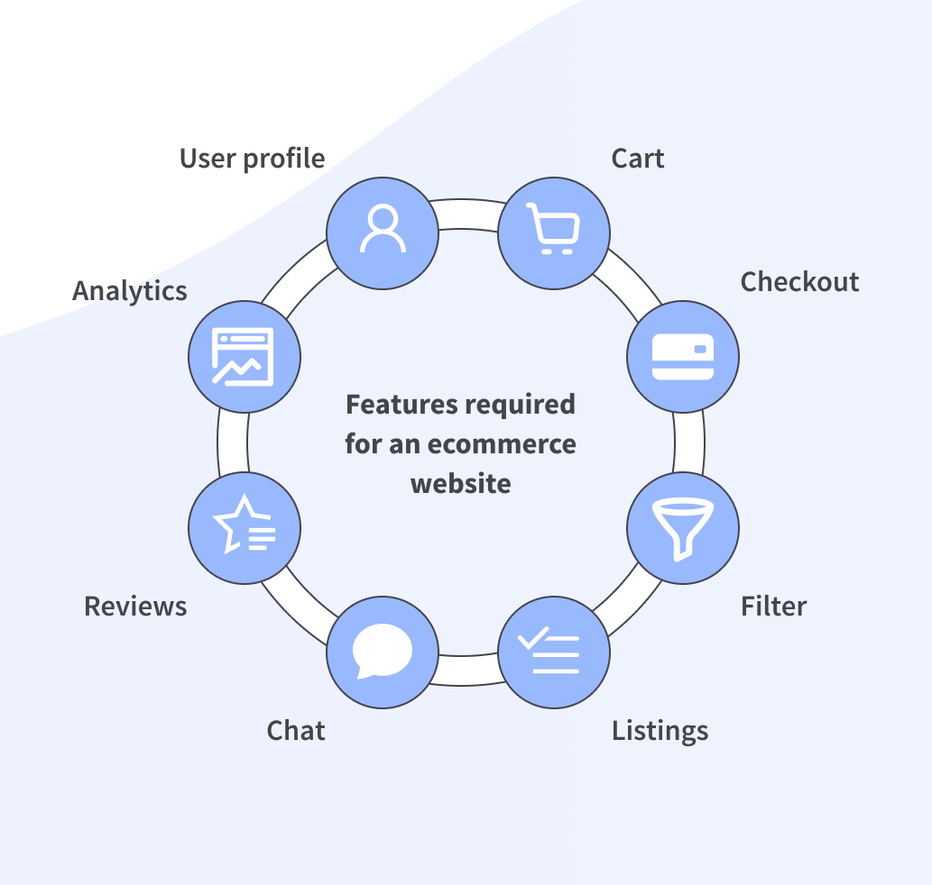
Even if you only implement basic features in the beginning, you should be able to scale up the website as time goes on. This is one of the benefits of investing in a custom e-commerce site, so be sure to discuss this as well.
Designing the User Interface and User Experience
This is the part that everyone tends to enjoy. The user interface determines how your website will look to visitors while user experience refers to how easy and enjoyable it is to use the site. If visitors enjoy using your website, they’ll spend more time exploring it and they’ll be more likely to make a purchase. UI and UX have implications for both your bounce rate and your revenue so they're extremely important.
Planning How You’ll Market the Site
No matter how amazing your site looks and how well it functions, it won’t be successful if no one knows it exists. While you’ll want to utilize several digital marketing channels, search engine optimization will be key. Most people turn to Google or another search engine when they want to make a purchase. If your website doesn’t show up on the first page of the search results for relevant search terms, you’ll lose out on visitors and potential customers.
Watching the Development Process
You’ll work back and forth with the development team on all the above steps. When you’ve decided on the prototypes and all the features you want, the team will work on making the site a reality.
Testing and Launching the Website
When the development stage is over, the only thing left is to turn the site over to professional testers who will look for bugs. Any problems will be fixed and then it will be time to make the site public.
Continuously Improving the Site
Your customers will likely offer feedback, and their suggestions should be considered. Your website will also need to be tweaked over time in response to trends, changes in your business, and other factors. Be sure to ask your developer about the type of support they offer after handing over an e-commerce website.
How Much Does it Cost to Build an E-Commerce Website? A Rough Guide
Maybe this is what you’ve been waiting to hear. When people decide to build an e-commerce website, one of the first things they think about is cost. This is understandable since no business owner wants to spend more money than they have to.
An e-commerce website is likely to cost $5,000 and up. There are several variables involved so it’s hard to get specific. The more pages and features you need, the more the site will cost. The only way you get a more accurate estimate is to talk to a developer about your needs.
Get Professional Web Development Services from Direct Line Development
As you can see, a lot goes into building a successful e-commerce website. While you may be setting up a site because you want to sell products, you also need to focus on strengthening your brand, creating an experience for visitors, and making it easy for Google and other search engines to find you. The experienced team at Direct Line Development can help you every step of the way. Not only do we know how to build an e-commerce website, but we know how to ensure it’s successful.
If you want more information about why a custom development would be right for your business, contact us today to schedule a consultation.


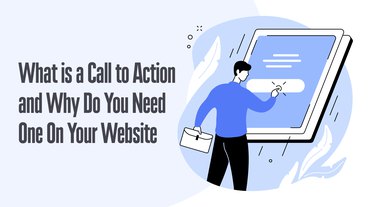
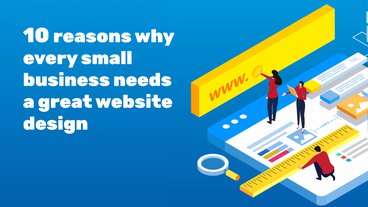
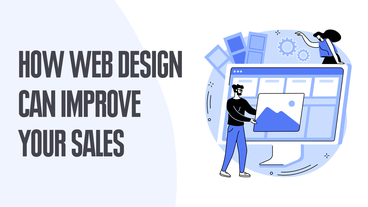
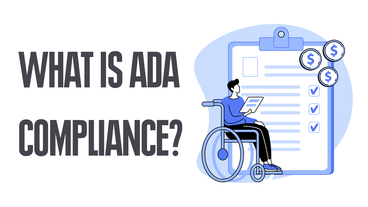

Comments